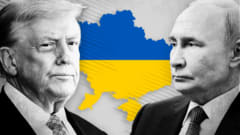Ukraine's Resolute Stance: The Complex Geopolitics of Territorial Integrity
 The Tech Times
The Tech Times
The conflict between Ukraine and Russia has been a persistent geopolitical issue since Russia's annexation of Crimea in 2014. Recently, the tension between the two nations has once again become a focal point, as Kyiv firmly rejects the notion of ceding any territory seized by Russia to secure a ceasefire. This stance by Ukraine underscores the complexities of maintaining territorial integrity amidst ongoing conflict and international diplomatic efforts.
The Historical Backdrop
To comprehend the gravity of Ukraine's current position, it's essential to revisit the historical context that has given shape to the present scenario. The annexation of Crimea by Russia in 2014 marked a significant turning point not only in Ukrainian-Russian relations but also in global geopolitics. This event was viewed by many Western nations as a blatant violation of international law, leading to widespread condemnation and the imposition of sanctions on Russia.
The subsequent conflict in Eastern Ukraine, particularly in the Donetsk and Luhansk regions, has resulted in a protracted war that has claimed thousands of lives and displaced many more. The Minsk agreements, designed to facilitate a ceasefire and political resolution, have seen limited success. The complex interplay of local separatist forces, Russian influence, and Ukrainian sovereignty continues to drive the conflict, making negotiation and peace elusive goals.
Diplomatic Efforts and International Dynamics
The Trump-Putin summit highlighted the intricacies of international diplomacy in resolving the Ukrainian crisis. While past summits have aimed at thawing relations and finding common ground, Ukraine's steadfast rejection of any territorial concessions reflects deeper issues of national identity and sovereignty.
Ukraine's position is supported by its Western allies, who have consistently advocated for the restoration of Ukraine's territorial integrity. Nonetheless, Russia's geopolitical strategy often involves leveraging its influence in neighboring regions, complicating any potential resolution. The situation is further exacerbated by the fluctuating international landscape, where shifting alliances and priorities can alter the dynamics of support and negotiation.
The Road Ahead: An Uphill Battle for Peace
The current impasse raises profound questions about the future of peace in Eastern Europe. Ukraine's refusal to cede territory is not just a political statement but a reaffirmation of its national identity. However, this stance also presents significant challenges in navigating the tumultuous waters of international diplomacy.
For Ukraine, the path forward involves balancing its sovereignty with practical steps towards de-escalation and eventual peace. For the international community, supporting Ukraine while engaging Russia in constructive dialogue is imperative to prevent further escalation and instability.
As the world watches, the Ukrainian crisis remains a poignant reminder of the complexities of modern geopolitics. The struggle for territorial integrity, national identity, and peace continues to unfold, with implications that extend far beyond the borders of Ukraine.
In conclusion, while the road to resolution may be fraught with challenges, the perseverance of diplomatic efforts and the unwavering stance of Ukraine are crucial to paving the way for a peaceful future. The ongoing dialogue between world leaders and the steadfast resolve of the Ukrainian people symbolize the enduring quest for sovereignty and peace in a world marked by conflict.
Source: In maps: The war-ravaged Ukrainian territories at the heart of the Trump-Putin summit
Subscribe to my newsletter
Read articles from The Tech Times directly inside your inbox. Subscribe to the newsletter, and don't miss out.
Written by
